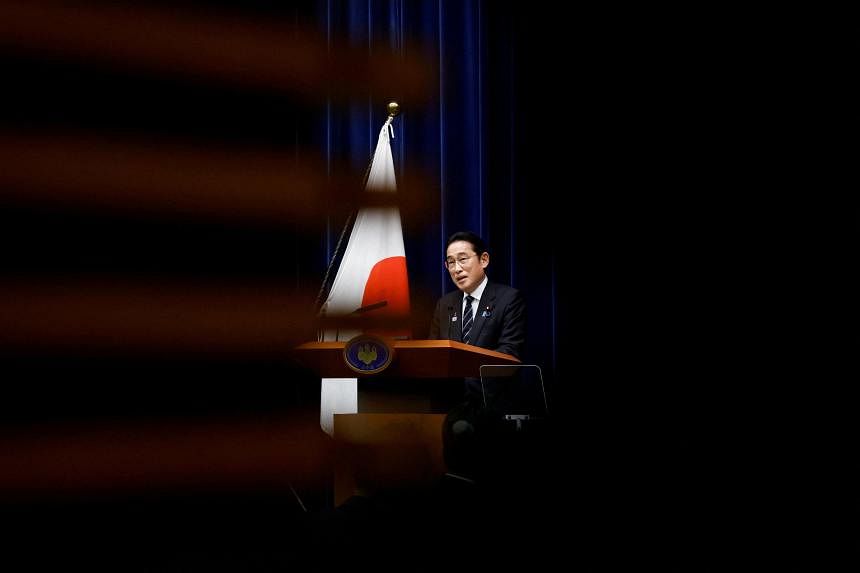TOKYO - Japanese Prime Minister Fumio Kishida’s approval ratings have sunk to new lows, with Japan entering a recession and ceding its place as the world’s third-largest economy to Germany.
He also continues to be troubled by scandal. It was reported on Feb 13 that more than one in five lawmakers from his ruling Liberal Democratic Party (LDP) – or 85 out of 374 parliamentarians – had fattened their wallets by keeping political donations off the books, the latest development in a slush fund scandal.
Mr Kishida, who on Feb 14 became Japan’s 10th longest-serving leader at 864 days, is now among world leaders with the lowest approval ratings, alongside the likes of Rishi Sunak of Britain and Olaf Scholz of Germany.
On Feb 15, a Jiji News Agency poll pegged his support at just 16.9 per cent in a nadir for Mr Kishida’s government. Another survey on Feb 13 by public broadcaster NHK showed approval at only 25 per cent.
These polling figures are lower than those of United States President Joe Biden (38 per cent) and South Korean President Yoon Suk-yeol (29 per cent), who are facing down questions, respectively, over mental fitness and a controversy surrounding a gifted Dior bag.
Meanwhile, the Mainichi newspaper in December 2023 found Mr Kishida to be the least popular leader in its 76 years of conducting monthly surveys on political sentiment, when his disapproval ratings hit 79 per cent. He is the 34th prime minister to take office over a period that has encompassed many forgettable faces and loathed figures.
While a general election is not due until October 2025, Mr Kishida faces Diet by-elections in April, as well as internal party polls due in September with the expiry of his three-year term as LDP president.
Government insiders, who described him as “stubborn”, told The Straits Times it was highly unlikely that he would step aside, as his predecessor Yoshihide Suga had done after just one year in office.
But Mr Kishida would have to pull a rabbit out of the hat to secure his political survival.
Sophia University political scientist Koichi Nakano told ST that, despite the ailing economy, government spin doctors will likely portray the bullish run of the Nikkei 225 index to close at a 34-year high on Feb 15 as a huge positive.
“People’s wallets are suffering, but the official line is that these profits will eventually filter down to the average citizen,” he said, adding that voters will see through populist measures such as a planned one-off tax cut in June.
Substantial wage increments will, however, require an equally substantial mindset change among large companies used to a deflationary mindset. Leaner small-and-medium enterprises, which account for more than 99 per cent of the workforce, also have far less leeway to increase salaries.
Mr Kishida is possibly looking towards diplomacy to give his approval ratings a lift.
He is planning a visit to South Korea on March 20 for talks with South Korea President Yoon Suk-yeol. Three weeks later, he will jet off to Washington DC for an April 10 state visit hosted by United States President Joe Biden.
Likely on the agenda at both summits will be Mr Kishida’s much-hoped-for talks with North Korean leader Kim Jong Un, which a Feb 13 report in the Financial Times described as “a bid to save his faltering premiership”. Tokyo has yet to confirm or deny the report, which described Mr Kishida’s government as “intensifying efforts” to this end.
“I think this (the push for a Japan-North Korea summit) is in part a diversionary move by Kishida. He is seeking a foreign relations home run so that he can overcome the present domestic difficulties,” said Dr Tosh Minohara, who chairs the Research Institute for Indo-Pacific Affairs think-tank.
Japan and North Korea do not have diplomatic ties. Any meeting between their leaders will be the first since a 2004 meeting between then Prime Minister Junichiro Koizumi and Mr Kim’s father, Kim Jong Il.
The younger Mr Kim gave Mr Kishida an opening for a diplomatic overture in January with a rare condolence message for the New Year’s Day 7.6-magnitude earthquake that hit Japan’s Noto Peninsula, killing at least 242 people.
Japan’s top priority is to secure the return of all the citizens abducted by North Korea in the 1970s and 1980s, although Pyongyang has long insisted that they are dead and the matter is closed. Five abductees were returned in 2002, with their North Korean-born children moving to Japan in 2004 after the diplomatic breakthrough.
The FT cited sources as saying that the proposed summit has hit a roadblock because Mr Kim was “refusing to cooperate over the abductees”.
Mr Kim’s sister Kim Yo Jong said, according to comments on North Korean state media KCNA on Feb 15: “If Japan shakes off its bad habits, the Prime Minister could visit Pyongyang one day.”
She added that as far as she knew, there were no plans to make contact with Tokyo.
Still, Dr Toru Yoshida of Doshisha University in Kyoto did not think the needle has shifted, noting that Tokyo’s official line since Mr Shinzo Abe was in office had been that Japan was open to talks with North Korea without any preconditions.
He added that Japanese voters accustomed to belligerent North Korean behaviour – on Feb 14, Pyongyang launched cruise missiles into waters between Japan and South Korea for the fifth time in 2024 – were unlikely to view any summit with North Korea favourably unless it yields concrete results.
Dr Nakano added, noting that Mr Kim would be well-aware of Mr Kishida’s political pressures: “Even if Kishida hopes to score brownie points, he will be criticised especially by the right for giving Kim legitimacy without getting anything in return if a meeting between the two leaders does not lead to much.”


